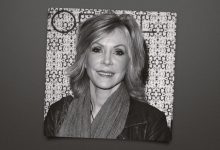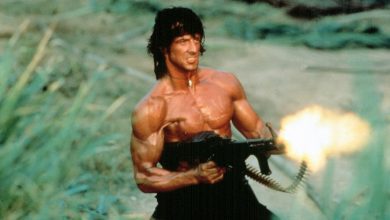‘Matlock’ Director on How Kathy Bates and Their CBS Hit Are Subverting the Age Trope
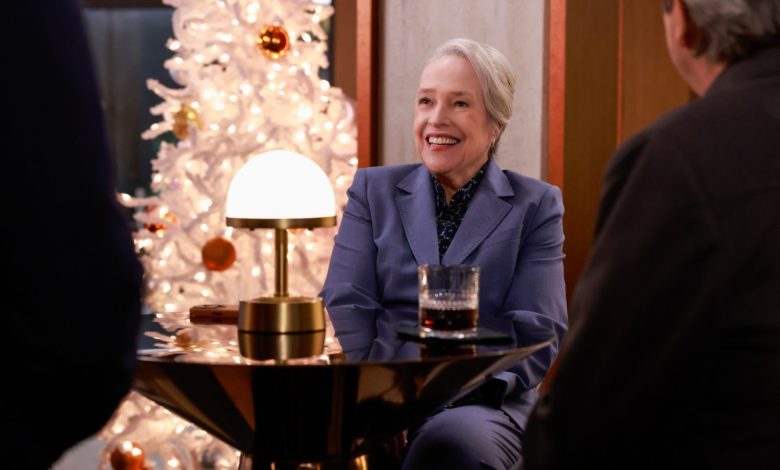
Matlock starring Kathy Bates on CBS has been winning this television season. Packed with humor, intrigue and charm, the show, audiences and critics have gleefully discovered, is not a reboot. Yes, there are legal cases and the older Bates’ character is named Madeline “Matty” Matlock — who emphasizes her last name as “Matlock, like the old TV show” in the pilot. But so much more than a gender swap resurrection of a past hit show or a mere procedural where cases get solved on a weekly basis in the most unlikely of ways, this Matlock about a septuagenarian who is not quite whom she seems to her law firm colleagues and supervisors has a lot more bite.
As was revealed in the pilot, which aired in September, Matty Matlock is not the poor, down-on-her-lock septuagenarian forced to go back to work to support herself and the grandson she’s raising alone that she portends to be. Instead, she’s the happily married Madeline Kingston who is quoting rapper Meek Mill, “rich-rich,” and has the mansion and chauffeur to prove it. What she truly is, however, is far more sobering. She’s a grieving mother who lost her daughter to the opioid crisis and weasels her way into law firm Jacobson Moore with the plan to bring down both them and the Big Pharma client she blames for her daughter’s death.
But the ruse she cooks up with the aid of her 12-year-old grandson Alfie (Aaron D. Harris) and support of her husband Edwin (Sam Anderson) — playing on society’s continual dismissal and erasure of “harmless old women” — involves other people. At the law firm, she’s supervised by Olympia (Skye P. Marshall), a smart-as-a-whip junior partner aspiring for more at Jacobson Moore who is also the estranged wife of Julian (Jason Ritter), with whom she shares two kids, and whose father Senior (Beau Bridges) heads the firm. Matty also shares an office with two young lawyers — anxiety-ridden overachiever Sarah (Leah Lewis) and working-class kid made good Billy (David Del Rio), who suffers from imposter syndrome.
What isn’t part of her plan is adoring her colleagues Sarah and Billy, and growing to like and respect her team leader Olympia, a younger Black woman who thrives in excellence. As they solve case after case — like in episode three, “A Guy Named Greg,” where a young female lawyer brings a sexual harassment suit against the male lawyer who outranks her at the firm; or the unlikely class-action lawsuit against a corrupt prison system from female inmates led by a recovering addict in “Claws,” episode five — Matty digs a deeper hole in her heart, making her mission to avenge her daughter’s death far harder than she anticipated.
And Kat Coiro, who directed the pilot and several more episodes, including the most recent episode six “Sixteen Steps” featuring two married moms once again trying to bring a baby formula manufacturer to justice for the death of their newborn, has a front-row seat. Not only does she direct the show; she’s also an executive producer.
Coiro, who studied theatre and started out as an actress, appearing in episodes of Charmed, Judging Amy, Law & Order: SVU and other TV shows, found her joy behind the camera early. While working a variety of jobs on set, the Manhattan-born, Florida-raised Coiro started writing and directing shorts and then making her own indie feature films like her 2011 debut Life Happens and Italian-shot 2013 film And While We Were Here, a festival fave. From there, she directed dozens of TV shows, including Girlfriends’ Guide to Divorce, Brooklyn Nine-Nine, Modern Family, Girls5Eva and the Marvel series She-Hulk: Attorney at Law. The wife and mother also found box office and streaming success with the 2022 film Marry Me starring Jennifer Lopez.
Below, Coiro speaks to The Hollywood Reporter about how she found her happy place with the surprising CBS breakout hit Matlock alongside Bates and show mastermind Jennie Snyder Urman, as well as behind-the-scenes insight on why this show, which is now on Thanksgiving break and already renewed for a second season, works and what fans can expect when the season returns in January.
***
How did you get connected to Matlock?
It’s actually a funny story. I met Kathy Bates for a film that never ended up getting made, but we really connected and kept in contact. And then when my agent sent me the script of Matlock with Kathy attached, it was kind of like the universe bringing us back together. And I met Jennie, and she’s a dream. So I ended up doing the pilot back in 2023 before the strike. And usually I’ll do a pilot, maybe do one or two episodes, but, with this show, I was like, “Jennie, I want to come and do as many as possible because I love working with you guys on the show.” And I ended up coming back and doing half the season, which was just so fun.
What attracted you so strongly to this show?
I think the layers of this show are so unusual, because it’s got the kind of cozy feeling of a procedural, but it is so much more than that. You’ve got Matty’s secret identity, which makes it both the procedural and a serialized drama that I think just tackles so many themes: you’ve got the invisibility of aging; you have a woman later in life coming back to her career and approaching it in a totally new way; you have the idea of justice, and someone who’s experienced the most devastating loss and finding her way of processing it — and it’s also funny. For me, it was really gratifying to work on something that has such depth but then also lightness. And I think the lightness makes the depth more profound.
How did you approach directing the pilot episode, which sets the tone for the show?
It was a really collaborative experience. Jennie has a very strong vision, and so we kind of became one brain. One thing that I will say is unusual about this show is the detail in the characters’ reactions to things and little moments of connection between characters. And that was something we established in the pilot. In every episode I’ve done, and with all the other directors, what I’ve talked about a lot, is when someone touches somebody’s hand, it has a lot of meaning, and you have to make sure you shoot that. Matty’s superpower is being able to observe human nature. She’s kind of like a human lie detector. Because she has all these different levels of agendas, she has to look at how everybody interacts, and so the camera has to do that with her. A lot of the show is from her point of view and so what seems like a simple scene actually has a lot more shots than a normal scene because of all the little looks to each other and the little details that we’re catching.
Are there any episodes that have aired that were most challenging for you?
A pilot is always challenging, especially because we were burying the lead, and we wanted it to seem like a pretty straightforward fish out of water, workplace, hourlong show. And then the end [has] this twist that upends everything. So making sure we weren’t tipping our hand, but also laying down the little clues [was challenging]. If you go back and look, you can see that everything she was doing was very calculated. And the pilot is always challenging in that way. And then episode six was kind of our first time going into extensive flashbacks, and that was something we talked about a lot. You know, how do we weave those flashbacks into the fabric of the show and have it feel different? But also, part of the whole? And so that was a fun challenge. It’s honestly been such a fun show to work on.
You directed the pilot episode and then you also directed the second episode, which follows the reveal, which is a big one. How did you move in the second one with the secret being out?
Well, the secret’s out to the audience, right? But not in Matty’s world. And so again, it was talking a lot with Kathy about the subtle differences between Matty Matlock and Madeline Kingston. And there are differences in mannerisms and costume, in accent, that she switches back and forth with. And we talked a lot about that and how important it is for her to hold up this facade of a harmless little old lady because that’s how she gets all the information. How she works slowly towards her goal is by maintaining this illusion and playing on everybody’s stereotypes that a little old lady couldn’t possibly have an ulterior motive. And that’s the fun, I think, of the series, really.
The trick society kind of plays on all of us is that women at a certain age are useless.
Exactly and it’s so important having Kathy’s point of view there as somebody, if you’ve read the interview she did for The New York Times, [who] experienced a period of invisibility, and suddenly this show has been part of making her visible again and showing just how vibrant and relevant someone can be in their 70s once they move past the societal perception of what older women are. Older women really have a wealth of experience, but often they’re not regarded in that way. To me, what makes this show so subversive is that it really turns the perception of older women on its head.
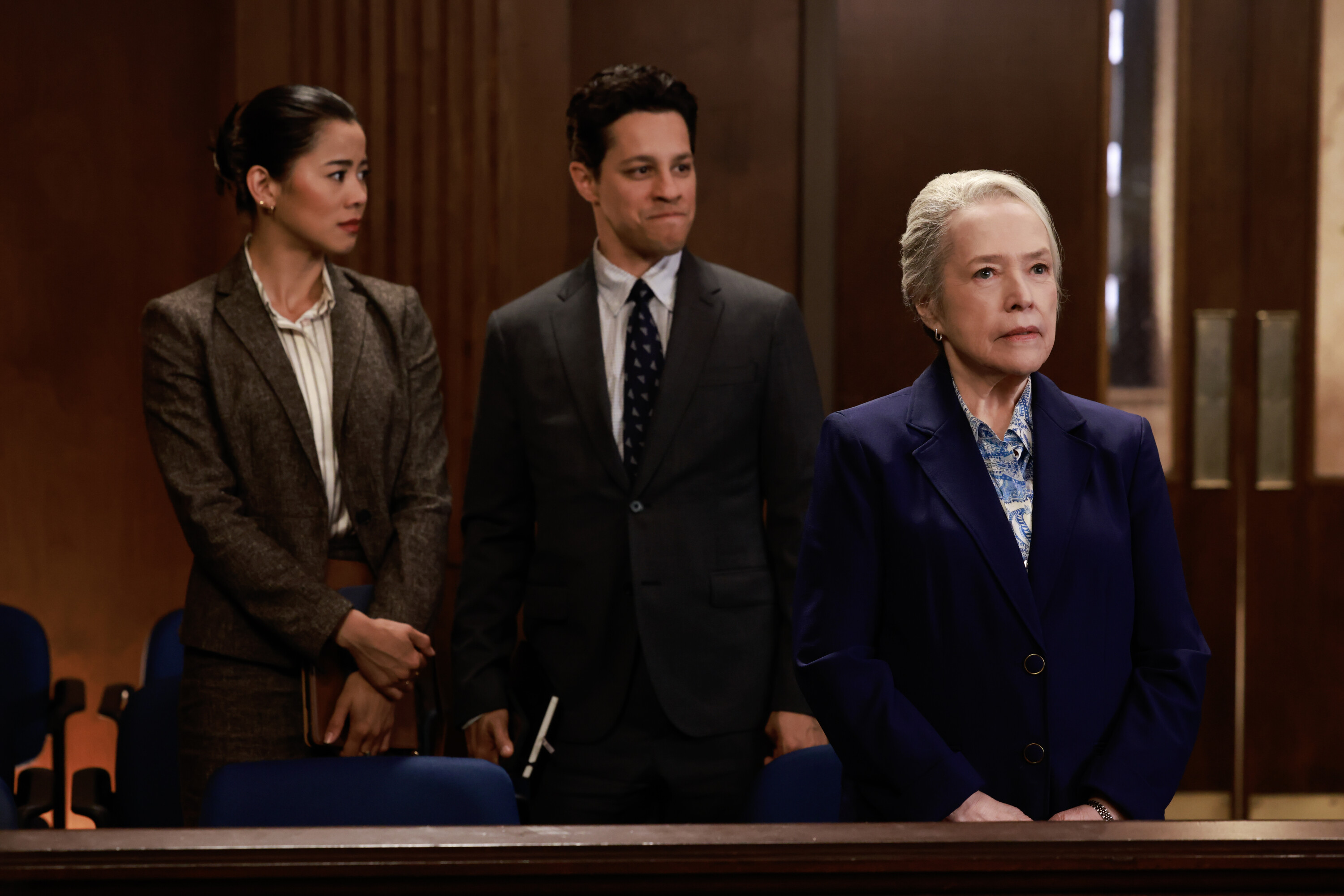
We’re seeing a lot more of that in Hollywood, and I think it has a lot to do with having more women behind the scenes.
Definitely! Jennie has the whole show in her head in such a clear way, and it’s such a pleasure to work with her. I think, for her, the hook was society’s perception of women. And I do think she has, obviously, a very female perspective on it being a woman and being a woman who is not in her 70s, but we’re all getting older, and so whether you’re in it or whether you’re looking at the way women are treated, it’s definitely something on all of our brains.
How do you choose which episodes you direct? How is that decision made?
I did episodes one, two, four and six, and then I took a little break, and then I came back and did episodes 12, 14, 16, 18 and 19. I just wanted to come and be as involved in the show as possible, because I love it. I love working with Kathy, and I love our whole cast, but Kathy is like a master class every day, and I’ve been very grateful for as much time as I could spend watching her.
Do you think if you hadn’t already met Kathy Bates before the show came along that you would have been more intimidated by working with her?
No, she’s an incredibly relatable, warm and humble person, and I think that’s part of what makes her such a brilliant performer. The way that she interacts with the guest cast [is great]. I think a lot of people come in and they are ready to be intimidated, and then she just immediately makes people feel comfortable. And she’s so grateful to be doing what she’s doing. And she’s so gracious. She’s someone who’s won all these awards and has been working for so long, but she really approaches everything as if it’s the first time, and that kind of excitement and curiosity and enthusiasm immediately puts people at ease. So I think even if I hadn’t met her, she would have done that to me as well.
Back to the show’s direction, what kind of tone have you set for other directors?
I have a meeting with every director and just kind of walk them through what I consider to be top tips. And there was a small visual Bible that we, the DP and I, made of shots that really work for the show and shots that maybe don’t apply to this show. And Jennie has such a strong hand in every episode also, so she works very closely with the other directors. But, yeah, the continuity has been a gift, because a lot of times in broadcast, you have a new director every week, and that can be part of the challenge for the directors, for the actors in keeping that continuity.
We know you direct a lot of the series, but what other decisions are you involved in? For instance, are you involved in casting?
Yes. Our core cast was all cast during the pilot, and that was, again, incredibly collaborative between me and Jennie and the other producers, and we feel like we hit gold. They’re all just so perfect and embody and elevate what was on the page. And that’s always such a huge part of the equation when you’re making a show: Does the cast gel? Do they get along? Do they embody their characters? So with the pilot, when you asked about challenges earlier, getting the casting right was so important. And one of my favorite behind the scenes fact of this show is that when Skye [P. Marshall who plays Olympia] came in to do her screen test with Kathy, you could immediately tell that not only is she really great actress, but the bond between Kathy and Skye was instantaneous, and those two have become real friends. They have this love that I feel comes off the screen that informs Olympia and Matty’s relationship and makes that relationship, which is the heart of the show, so deep.
It’s an interesting one too, because we do not often see an older woman and younger woman bond on screen, and especially not across racial lines.
I think, in a lot of ways, it’s a completely unique relationship. And, as [seen] in the first six episodes, part of what Matty struggles with is that she is conducting a subterfuge, but she actually really likes Olympia and is learning from her. And Olympia really likes Matty, and despite her initial perception of her, comes to depend on her. Part of what makes this show, I think, so rich and layered, is that they are working in this way where they’re both learning from each other. They both really respect each other, and yet there’s a whole level of deception going on.
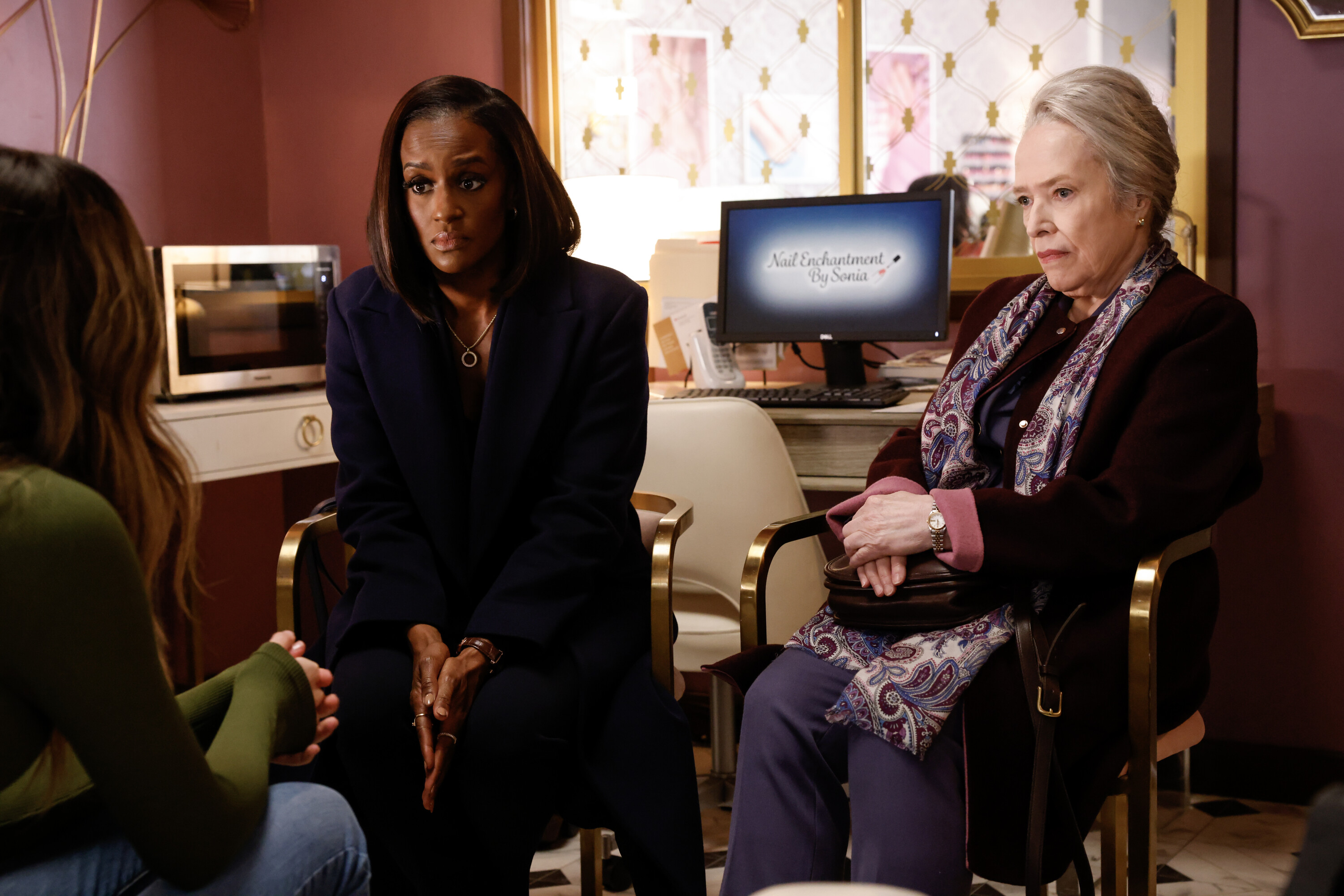
Let’s talk about episode four “The Rabbit and the Hawk” with the widower, which is kind of a loss for the legal team, but also a wake-up call for Matty and the overall series.
Well, I think one of the things that Matty did not take into consideration when she came up with this plan was that so many human beings would be involved emotionally. I think she thought, “Okay, I’m going to go in; I’m going to get big pharma; I’m going to find the answer to my question, and kind of avenge my daughter’s death and bring justice.” And then each episode, there is a human being whose life is on the line, whose dignity [is at stake]. In the pilot, you have the guy who’s been [falsely imprisoned] and fights [for compensation] with his daughter, and they win, and it’s like Matty really stepped into something much more complicated than she anticipated.
I think episode four with the man who lost his wife, it really strikes Matty that she is stepping into territory that is dangerous emotionally, and while she has her agenda, her actions are affecting real people, and she lies to that man [about being a widow]. And, in some ways, that episode felt like the real kickoff of the season because the pilot obviously was its own thing and then episode two is so jam-packed, and you’re kind of reestablishing who everyone is. Episode three takes Matty into the courtroom for the first time. And then episode four is where it kind of settles into, “Okay, here is the show,” and watching her get so entangled emotionally with that widower, I thought she really has to look at what she’s doing and [ask], “Am I prepared to do this in the name of my daughter?”
Episode six, which you also direct, is the first one to feature a same-sex couple and it’s in the context of them being parents. How gratifying is it to be able to present a reality for so many people, and it not be couched in just their sexuality, but always in their humanity?
It goes back to the diversity in the writers room and the diversity on the production side, and the desire to tell stories that are about human beings. These two mothers went through something terrible, and that really is what the story is about. It’s not about how they identify or who they are. That’s a very powerful thing for people to see and I feel very proud to be a part of a show that explores so many different perspectives, and does it in a very conscious way from the top down.
Though we have a lot of episodes to go between when the series returns in 2025 and the finale you directed, where can we expect this journey to take us?
It’s Matlock. It’s always going to star Matty. But I think one of the things that’s been really exciting watching the series unfold is having all the lead characters have their moment, and really seeing them blossom and come into their own. [To see] Sarah, Billy, Julian and Senior, these characters that, in the beginning, really served Matty and Olivia’s story, kind of coming into their own storylines and becoming really fleshed out, I think people will love that.
***
Matlock returns Dec. 5 and 12 for episodes seven and eight before taking another break with a scheduled return Jan. 30. In the meantime, read THR‘s interviews with star Kathy Bathes and showrunner Jennie Snyder Urman.
Source: Hollywoodreporter
Related Posts
- Roundball Rocked: With NBA Return Looming, NBC Purges Scripted Roster
- SoundCloud Says It “Has Never Used Artist Content to Train AI Models” After Backlash on Terms of Service Change
- Fox News’ Camryn Kinsey Is “Doing Well” After Fainting on Live TV
- Kerry Washington and Jahleel Kamera in 'Shadow Force.'
Courtesy of Lionsgate
…
- This Alternative Artist Landed a Top-20 Chart Debut With an Album Made Almost Entirely on His Phone



